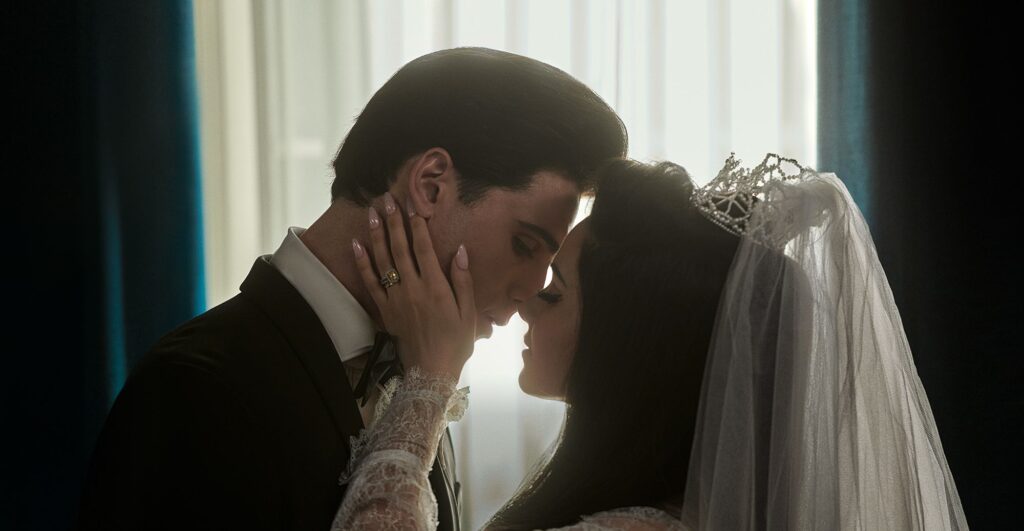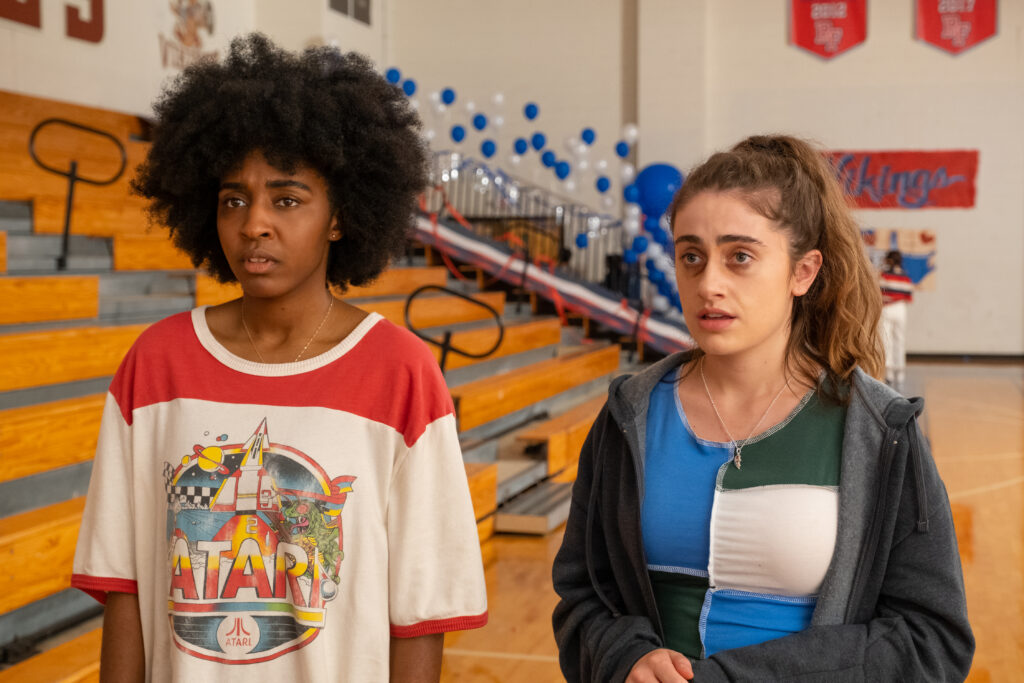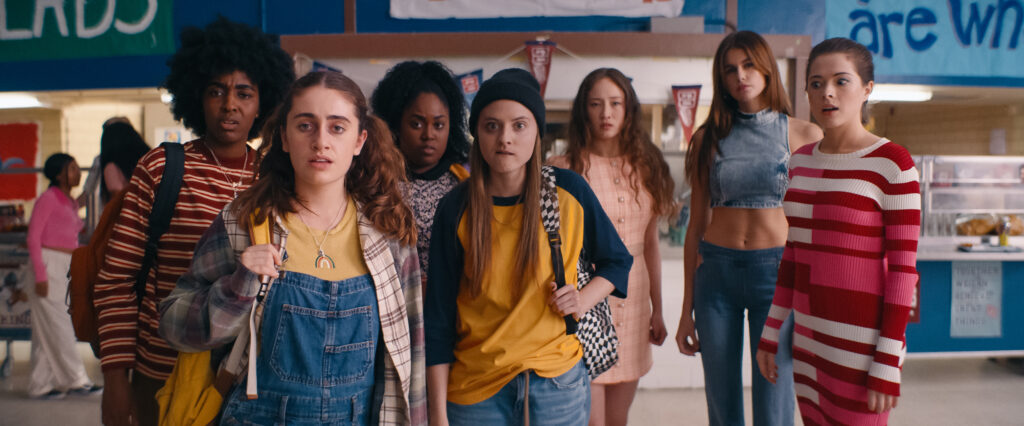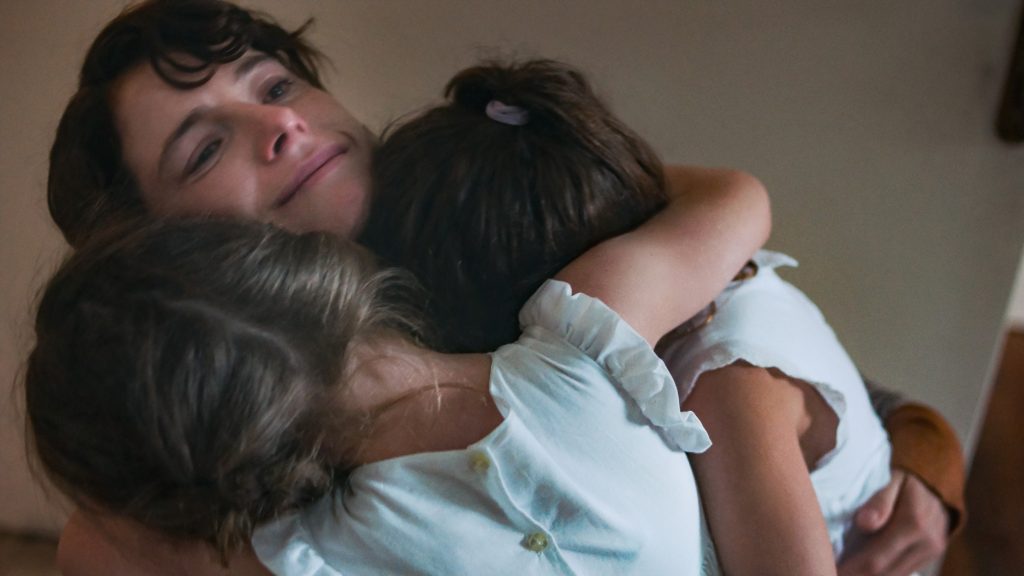January 26, 2024
by Carla Hay
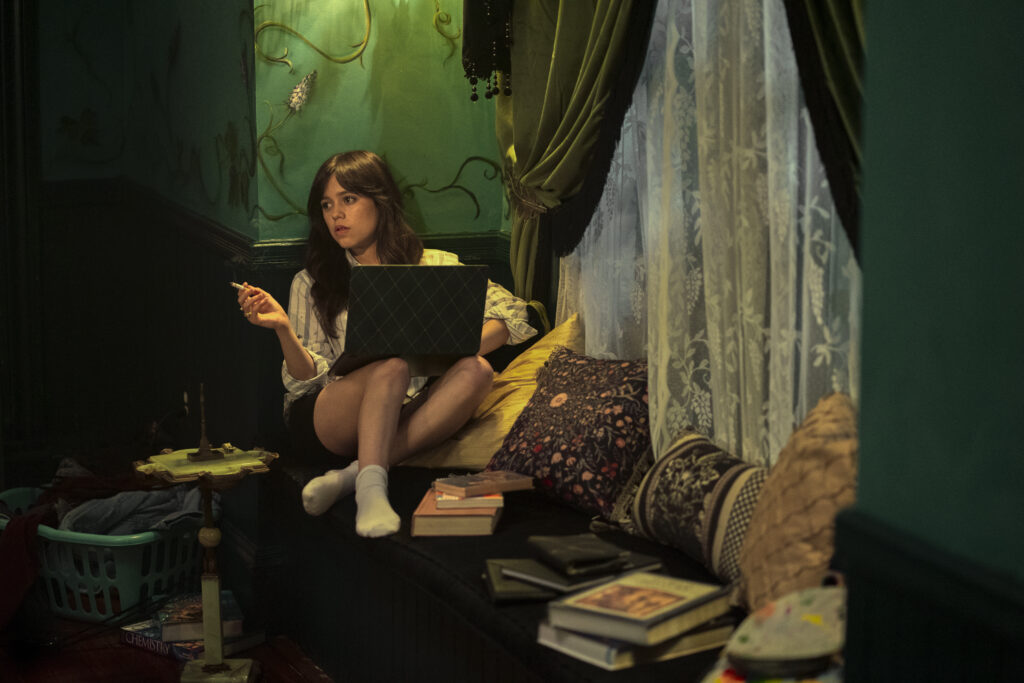
Directed by Jade Halley Bartlett
Culture Representation: Taking place in the fictional Opal County, Tennessee, the dramatic film “Miller’s Girl” features a racially diverse cast of characters (white, Latino and African American) representing the working-class, middle-class and wealthy.
Culture Clash: A wealthy and intellectual 18-year-old high school student sees how far she can go in trying to seduce her middle-aged and married literature teacher, who is attracted to her too.
Culture Audience: “Miller’s Girl” will appeal primarily to people who are fans of stars Jenna Ortega and Martin Freeman and shallow movies about inappropriate student/teacher relationships.

Too much of “Miller’s Girl” is phony: the pretentious dialogue, the fake accents, and the sexually curious teenagers who only flirt with teachers, not with other students. It’s a tacky drama trying to look artsy. The principal cast members seem to be doing their best to make things believable, but “Miller’s Girl” becomes undone by miscasting and other misguided directorial choices.
Written and directed by Jade Halley Bartlett, the overly verbose “Miller’s Girl” (which is Barlett’s feature-film debut) gives the impression that it was originally a novel adapted into a screenplay. Some viewers might be surprised to learn that “Miller’s Girl” is an original screenplay, even though the words in the movie sound like they were taken straight from a tawdry young-adult novel that’s trying to appear more intelligent than it really is. “Miller’s Girl” had its world premiere at the 2024 Palm Springs International Film Festival.
The central character and narrator of “Miller’s Girl” is a smug 18-year-old brat, ridiculously named Cairo Sweet (played by Jenna Ortega), who lives in an unnamed city in the fictional Opal County, Tennessee. In the movie’s opening scene, Cairo (who is an only child) tells viewers in a voiceover narration that she’s been left to live by herself in her family mansion because her parents are attorneys who are too busy with work and are “permanently abroad.” She lives on an estate called Victorian Village, which is very well-known in the area.
In an example of how fake this movie looks, Cairo is supposed to be fabulously wealthy, yet there are no servants or other employees who are seen taking care of the mansion and the rest of the property. In fact, Cairo is the only person seen in this big house. It’s supposed to make Cairo look like “a poor little rich girl” who’s all alone, but it just looks like sloppy and badly conceived filmmaking. There’s more of this lack of realism throughout this entire movie that’s trying to look like a realistic and “shocking” exposé of the dark side of student/teacher flirtations.
Cairo wonders aloud in her voiceover what it means to be an adult, now that she is 18 years old. To deal with her loneliness, she finds solace in reading books and in writing. Her voiceover comments often sound like what someone would write in a private journal. Cairo has plans to attend Yale University, but it’s too early for her to know if she’s been accepted into Yale.
Throughout the movie, Cairo makes several comments about how she hates living in Tennessee (she thinks she lives in the middle of nowhere) and can’t wait to graduate from high school so she can move somewhere else, starting with Yale in Connecticut. The movie never explains how this wealthy teenager—who is now legally an adult with no supervision and who can afford to travel on weekends or holiday breaks—doesn’t go to places outside of Tennessee if she dislikes being in Tennessee so much. During the entire movie, Cairo is never seen anywhere but in whatever area where she’s supposedly “stuck” living. It’s just more phony-looking filmmaking on display.
Cairo is in her last year of high school, which is an unnamed co-ed public school. The movie starts at the beginning of the school year. She is an avid book reader and is very talented at writing. It should come as no surprise that Cairo excels in a literature class, where a teacher in his 50s named Jonathan Miller (played by Martin Freeman) almost immediately singles out Cairo as an exceptional student. It won’t be long before he finds out that there are pros and cons to Cairo’s exceptionalism.
When Cairo and Mr. Miller meet each other for the first time, she’s quick to tell him that she read all 12 books that were on his summer reading list. He’s very impressed. Jonathan used to teach in the school’s theater program before the school cut the program. He got to keep his job at the school by becoming a literature teacher. It’s one of a few indications shown early in the movie that Jonathan is grateful that he wasn’t laid off, and he has real stakes at keeping his job at the school.
When Cairo tells him that her parents are attorneys, he asks her if she wants to be an attorney too. Cairo replies sarcastically, “As much as I want to be a high school student.” She makes it clear that she wants to be Mr. Miller’s “teacher’s pet” and does things to show she’s attracted to him, such as bat her eyelashes at him coquettishly, or stare at him in lectures as if he’s a genius. Cairo also uses a lot of intellectual vocabulary to let him think that she’s more “mature” than the average student her age.
Jonathan is married to a woman named Beatrice June Harker (played by Dagmara Dominczyk), who is moody and frequently distracted by her work. Beatrice and Jonathan have no children. In scenes where it looks like Jonathan and Beatrice might become sexually intimate, something interrupts the moment, and it’s usually something that has to do with her work. Beatrice has some type of executive manager job, where she works remotely from home and is often heard complaining or ranting about her subordinates, many of whom she thinks are incompetent.
Beatrice can be fun to be around when she’s in a good mood. But when she’s in a bad mood, watch out: She lashes out with cutting verbal insults. She drinks a lot of alcohol, which might or might not be why Beatrice has such a mercurial personality. At one point, Jonathan tells her that she’s an alcoholic. It’s unknown how long she’s had this drinking problem.
Cairo is shown interacting with only one student at the school: a flaky wannabe nymphomaniac named Winnie (played by Gideon Adlon), who describes herself as an “equal opportunity” seductress, because she’s open to having sexual relationships with people of any gender. Winnie seems to have an unrequited attraction to Cairo, who does a little bit of flirting back with Winnie, but it’s all just a tease, because Cairo has no sexual or romantic interest in Winnie.
Winnie is obsessed with talking about sex and seducing people. She’s the one who brings up the idea that Cairo should have the experience of falling in love, or at least seducing someone, before Cairo goes to college. It’s later revealed that Winnie and Cairo are both virgins. Winnie is given absolutely no backstory in this movie. She’s a mostly one-note character whose only purpose in the movie is to be the “talkative and horny” friend. Adlon’s Tennessee accent for Winnie is over-exaggerated in this movie.
Winnie and Cairo are never shown interacting with the other students in a meaningful way. They are not shown attending any other classes. They have such little interaction with the other students, they might as well be homeschooled. But then, there would be no “Miller’s Girl” movie, which is all about teasing audiences into thinking they’re going to see a movie about a “forbidden” relationship between a teenage female student and an older male teacher.
Winnie is aware of how Cairo seems to have a growing attraction to Mr. Miller, even though Winnie and Cairo both know that he is married. Winnie suggests to Cairo that Cairo should try to seduce him and see how far it can go. Meanwhile, Winnie claims to be in lust with a faculty member in his 40s named Boris Fillmore (played by Bashir Salahuddin), who is a physics teacher and a coach of an unnamed team at the school. Boris has a jolly jokester personality, and he happens to be Jonathan’s best friend at the school. Winnie tells Cairo that she wants a real man to take her virginity, and she thinks Coach Fillmore is the ideal candidate.
Meanwhile, Cairo ramps up her seduction scheme when she finds out that years ago, Jonathan wrote an obscure collection of erotic short stories called “Apostrophes and Ampersands.” The book was a flop with critics and audiences, and he hasn’t authored another book since then. He seems to have completely given up on becoming a professional writer. Of course, Cairo finds the book and reads it.
Jonathan and Cairo meet after school in his classroom, where they continue to flirt by exchanging annoying and pompous banter, while Jonathan tries to pretend that there isn’t sexual tension between them. Jonathan can’t resist Cairo’s charms, so he gives special treatment to Cairo by telling her in advance about his mid-term assignment for the class, so that she can get an early start on it. The assignment is for each student to write an essay in the style of the student’s favorite author.
Cairo then quotes passages from “Apostrophes and Ampersands” to Jonathan, in order to flatter him. This manipulation works. He literally becomes teary-eyed with emotions when he finds out that Cairo not only has read his book but that she also seems to likes it so much that she memorized parts of the book.
Seeing him show this vulnerable side, Cairo continues her manipulation by asking Jonathan why he hasn’t written another book since then. “You’re uninspired,” she tells him. He says, “Are you judging me?” Cairo replies, “I’m challenging you.”
This appeal to his ego quickly prompts Jonathan to tell Cairo that she should go to a monthly poetry-reading event that he likes to attend. He doesn’t directly ask her on a date, but it’s a big hint that if she goes to this event, he will be there too. And sure enough, the two of them see each other at this event, where afterwards they flirtatiously share a cigarette.
“Miller’s Girl” takes on a double meaning when Cairo tells Jonathan Miller that she has chosen controversial erotic author Henry Miller to be the writer she wants to emulate in her mid-term essay. Jonathan Miller objects to this choice, because work from Henry Miller is not allowed in this public school system for children. Cairo doesn’t care and insists that Henry Miller is her choice. You know where all of this is going, of course.
Beatrice is aware that Jonathan has taken a special interest in one of his students (she has not met Cairo), but Beatrice doesn’t see it as a problem at first, because Jonathan describes it as an interest in Cairo’s talent. And even when Beatrice finds out that Cairo seems to be fixating on Jonathan, Beatrice laughs it off as a harmless and temporary teenage crush. Jonathan assures Beatrice that he is not romantically attracted to Cairo, but Cairo doesn’t see it that way at all. You can easily guess what happens next in this “teen temptress” movie.
“Miller’s Girl” is very off-kilter in how it presents Cairo. At first, she appears to be an intellectual loner who has no interest in dating anyone. She dresses like an innocent schoolgirl. But then, after just a few conversations with Winnie (whom Cairo doesn’t seem to like very much), she goes to school looking like a party girl who’s ready to go to a nightclub. Winnie offered to give her a makeover, but it’s never shown in the movie if Winnie actually gave her the makeover or if Cairo made these fashion choices on her own.
Cairo’s personality switch is much more jarring than her wardrobe switch. At first, she seems to be genuinely curious about falling in love and eager to have that experience. At one point, she seems to be so infatuated with Jonathan that she thinks he’s some kind of soul mate because she believes that they are both very similar to each other. But then, Cairo becomes a vindictive control freak determined to get her way, no matter who gets hurt. Because very little is told or shown about what Cairo was like before she met Jonathan, it’s not clear if she was this unpleasant all along, or if something about this relationship with this older, married teacher brought out the worst in her.
There’s more than a little misogyny in the way this story is told, because every female with a major speaking role in this movie is either portrayed as a “shrew,” a “seductress” or both. Jonathan is not quite an innocent victim, although the movie obviously wants viewers to have the most sympathy for him. As already revealed in the “Miller’s Girl” trailer, Cairo is supposed to be the villain of the story, even though Jonathan, as the teacher/authority figure in this situation, has more of the responsibility to stop whatever inappropriate flirting was going on between him and Cairo.
The worst thing about “Miller’s Girl” is not the cringeworthy dialogue, which gets worse as the movie starts to unravel in its pathetic attempts to be an erotic thriller. The worst thing about “Miller’s Girl” is not the questionable Tennessee accent that a miscast Ortega struggles to maintain during this lurid mess of a movie. The worst thing about “Miller’s Girl” is that by the end of the film, it becomes very obvious that “Miller’s Girl” is just as empty and soulless as the most of the characters in the movie.
Lionsgate released “Miller’s Girl” in U.S. cinemas on January 26, 2024.

